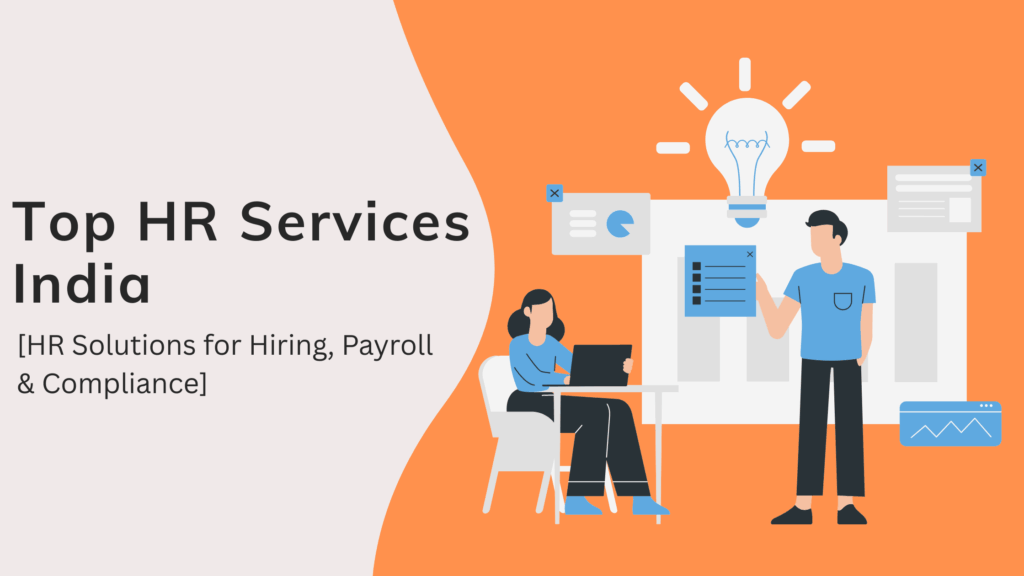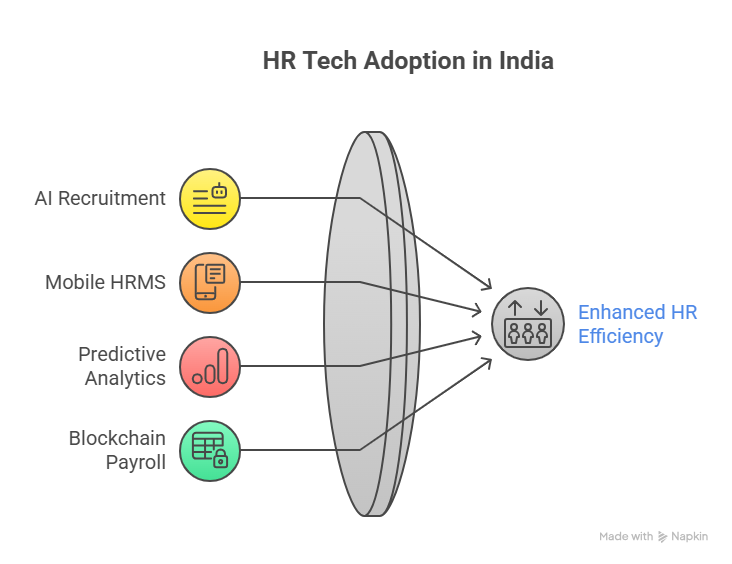Reliable HR Services to Enhance Your Business Operations

India’s fast-growing economy, with a projected GDP growth of 6.8% in 2025 (per IMF estimates), demands agile, cost-effective, and tech-driven HR services. As businesses scale in a competitive market with over 1.4 billion people and a diverse workforce, HR is no longer just administrative it’s a strategic enabler. From navigating complex labour laws to reducing attrition rates (e.g., 15–20% in IT, per NASSCOM 2024), modern HR solutions help companies thrive.
This comprehensive guide explores the full spectrum of HR services in India, their benefits, and how businesses startups, SMEs, and enterprises can leverage outsourcing or digitization to stay compliant, nurture talent, and focus on growth.
What Are HR Services?
HR services refer to a wide range of activities focused on managing a company’s human resources. This includes tasks such as recruitment, payroll processing, compliance management, employee engagement, and more. In India, HR services are often provided by in-house HR teams, consulting firms, or outsourced providers like Quikchex. With 70% of Indian firms adopting HR technology (according to Deloitte’s 2024 HR Trends), modern HR solutions are typically scalable, cloud-based, and designed to address challenges such as
- Recruitment & Talent Acquisition
- Payroll & Benefits Administration
- Employee Performance & Engagement
- Legal Compliance & Risk Management
- Training & Development
- HR Analytics and Reporting
These services are essential in helping businesses streamline HR operations, ensure regulatory compliance, and improve overall employee satisfaction.
Top HR Services in India for 2025
Here’s a breakdown of the core HR services transforming Indian businesses:
1. Recruitment and Talent Acquisition
India’s job market is fiercely competitive, with 29 million fresh graduates annually (per AISHE 2024). HR services streamline hiring with:
- Job role planning and JD creation
- AI-driven resume screening
- Interview scheduling and coordination
- Offer letter issuance and negotiation
- Campus hiring for fresh talent
Example: IT firms use platforms like Quikchex RMS to access pre-screened candidate pools, reducing hiring time by 30%.
2. Payroll Management
Payroll in India requires compliance with EPF, ESI, PT, and TDS regulations. Managed payroll services include:
- Salary and bonus calculations
- Digital payslip generation
- Direct bank deposits
- Tax filings (Form 16, TDS)
- Gratuity and leave encashment
Top Tools: Quikchex Payroll automates compliance filings, and offers employee-friendly payslip access.
3. Statutory Compliance and Labour Laws
India’s labor ecosystem is governed by the new Labour Codes (e.g., Code on Wages, 2019; Social Security Code, 2020), implemented across most states by 2025. HR compliance services ensure:
- PF, ESI, and PT filings
- Adherence to the Shops & Establishments Act
- Contract labor compliance
- Audit-ready documentation
Tip: Non-compliance can lead to penalties up to ₹7 lakh under the new codes outsourcing ensures accuracy.
4. HRMS and Cloud-Based Solutions
Cloud platforms automate HR tasks, with 60% of Indian SMEs adopting HRMS (per Zoho 2024 survey). Features include:
- Leave and attendance tracking (GPS or face recognition)
- Employee record storage
- Appraisal and performance dashboards
- Payroll integration
Popular Platforms: Quikchex, Zimyo, and factoHR offer mobile-first HRMS for remote teams.
5. Training and Development
Upskilling is critical in India, where 54% of workers need reskilling by 2025 (per WEF). Training services provide:
- Soft skills and leadership workshops
- Compliance training (e.g., POSH)
- Technical certifications
- DEI and inclusivity programs
6. Performance Management
Performance tools align employee goals with business objectives:
- OKR and KPI tracking
- 360-degree feedback
- Appraisal cycles
- Goal-setting frameworks
Trend: AI-driven analytics predict performance trends, reducing bias in appraisals.
7. Onboarding and Exit Management
Smooth transitions enhance employee experience:
- Digital onboarding with welcome kits
- Document verification
- Full & final settlements
- Exit interviews and knowledge transfer
Insight: Structured onboarding reduces early attrition by 20%.
8. HR Audits and Policy Development
HR audits ensure compliance and efficiency:
- Statutory compliance checks
- SOP and policy drafting (e.g., WFH, POSH)
- Process optimization
Example: Manufacturing firms use audits to comply with the Occupational Safety Code, 2020.
Benefits of HR Services in India
Leveraging HR services delivers measurable outcomes:
- Cost Efficiency: Outsourcing saves SMEs 20–30% on HR overhead (per PwC India).
- Compliance Assurance: Avoid penalties with expert handling of Labour Codes.
- Better Hiring: Access to 10 million+ candidate databases via platforms like Naukri.
- Employee Satisfaction: Transparent payroll and appraisals boost morale by 25% (per Gallup India).
- Core Focus: Free up 40% of leadership time by outsourcing admin tasks.
HR Services for Startups and SMEs
Startups and SMEs, with limited HR bandwidth, benefit from tailored solutions:
- On-Demand Recruitment: Hire for niche roles via firms like Lobo Staffing.
- Affordable HRMS: Tools like Quikchex HRMS start at ₹6,000/month.
- Contract Staffing: Mobilize gig workers for projects (e.g., logistics, retail).
- Remote HR Consultancy: Access experts via platforms like Quikchex.
Case Study: A Mumbai fintech startup used Quikchex to automate payroll, saving 15 hours weekly.
Contract Staffing and the Gig Economy
India’s gig economy, with 15 million workers, drives demand for contract staffing in IT, retail, and logistics. HR firms offer:
- Pre-screened, skill-based talent
- Fast workforce mobilization
- Compliance for gig workers
Trend: Payroll systems ensures transparent payments for gig workers, adopted by 10% of firms in 2025.
Digital HR: The Future of HR Management
HR tech is transforming India, with 80% of enterprises adopting AI-driven tools (per Gartner 2025). Key innovations include:
- AI Recruitment: Chatbots screen 1,000+ resumes in hours.
- Mobile HRMS: Employees access payslips via apps like Keka.
- Predictive Analytics: AI forecasts attrition with 85% accuracy.
- Blockchain Payroll: Enhances security for cross-border payments.

Choosing the Right HR Services Provider
When selecting an HR partner, evaluate:
- Domain Expertise: Industry-specific knowledge (e.g., IT, healthcare).
- Regulatory Knowledge: Familiarity with new Labour Codes.
- HR Tech Stack: Integration with other tools.
- Client Support: 24/7 helpdesk for multi-location firms.
- Cost Efficient Pricing: Check for Pricing which suits you requirements
Industries Benefiting from HR Services
- IT & Tech: Remote hiring, AI-driven performance tracking.
- Retail: Contract staffing, shift management.
- Healthcare: Compliance-heavy documentation, 24/7 HR support.
- Manufacturing: Biometric attendance, safety compliance.
- Fintech & Green Energy: Niche hiring, gig worker management.
FAQs: HR Services in India
Q: How much does HR outsourcing cost in India?
A: Costs range from ₹50 to ₹200/employee/month for payroll to ₹4,500 to ₹10,000/month for end-to-end HR, depending on services.
Q: What are the new Labour Codes?
A: The four codes (Wages, Social Security, Occupational Safety, Industrial Relations) simplify compliance but require updated HR processes.
Q: Can HRMS support remote teams?
A: Yes, platforms like Quikchex offer GPS-based attendance and mobile access for distributed workforces.
Ready to Streamline Your HR? Contact Quikchex India for a Free Consultation!
Conclusion: Why HR Services Are a Game-Changer
HR services in India are evolving into strategic partnerships that drive growth, compliance, and employee satisfaction. By outsourcing or adopting HRMS, businesses can save costs, stay ahead of the new Labour Codes, and attract top talent in a dynamic market. Whether you’re a startup in Bengaluru or an enterprise in Mumbai, HR solutions empower you to focus on what matters most your business.